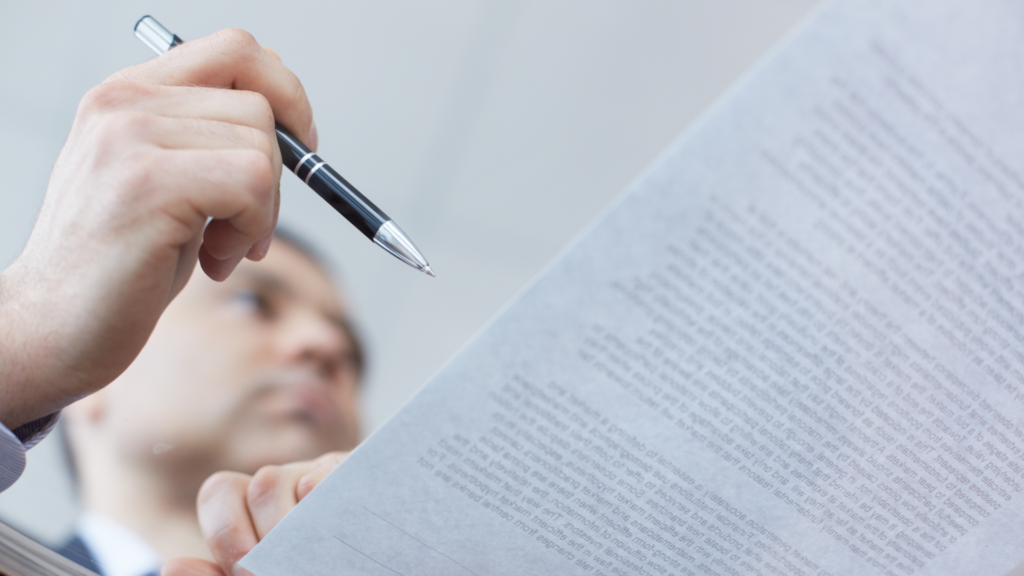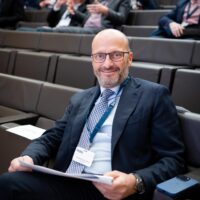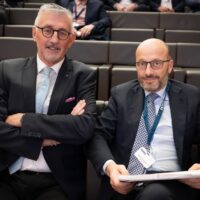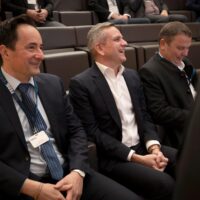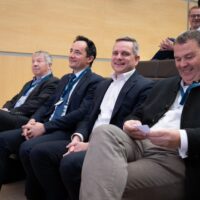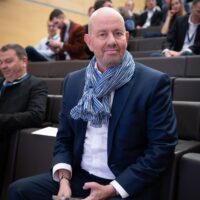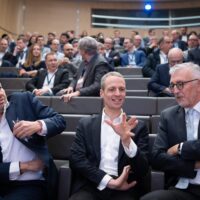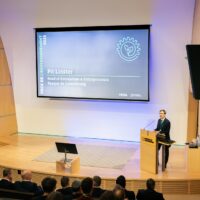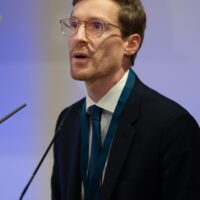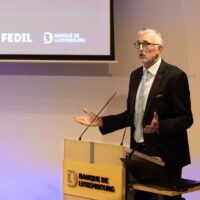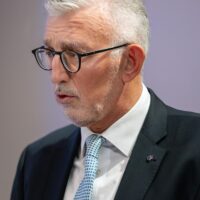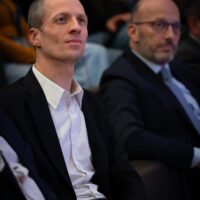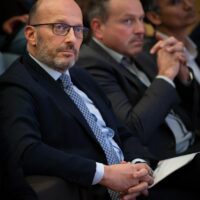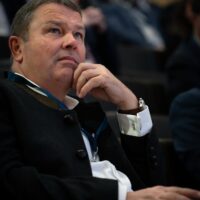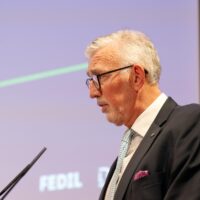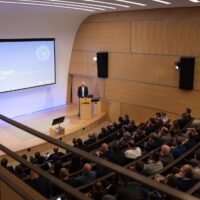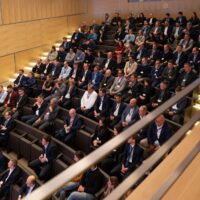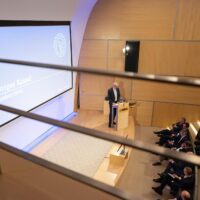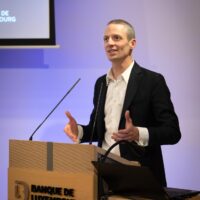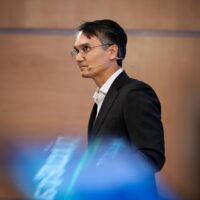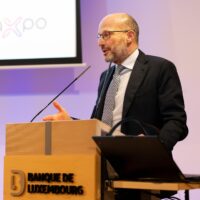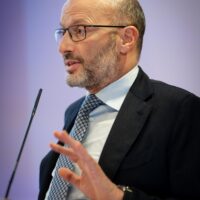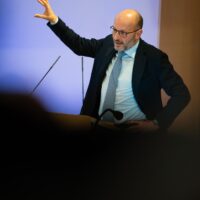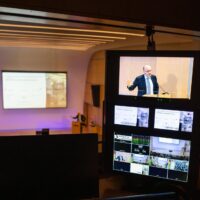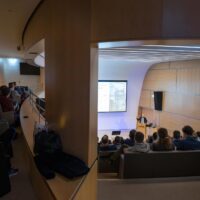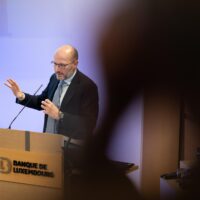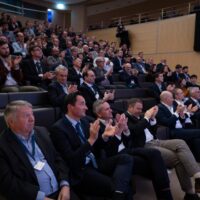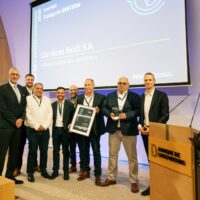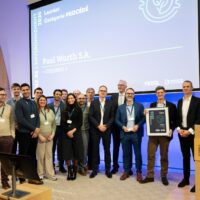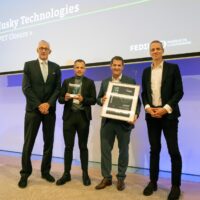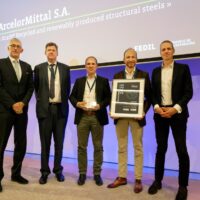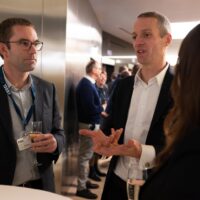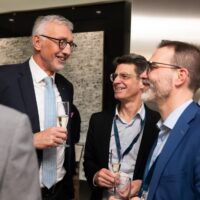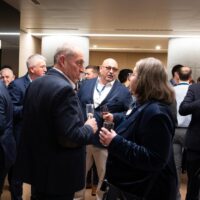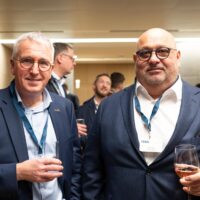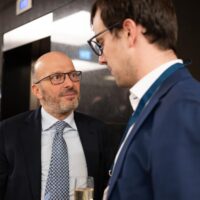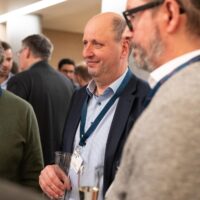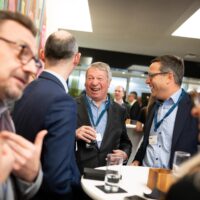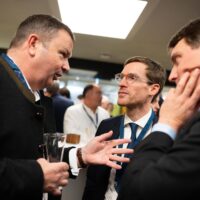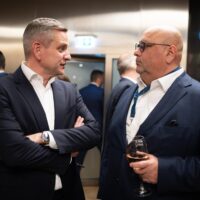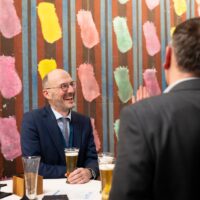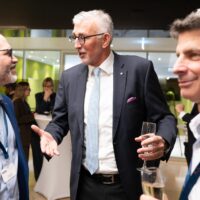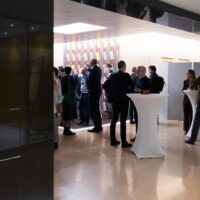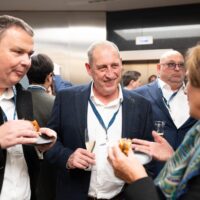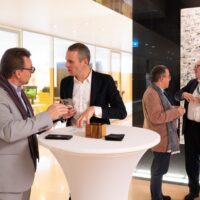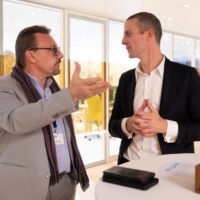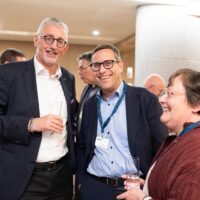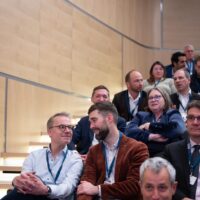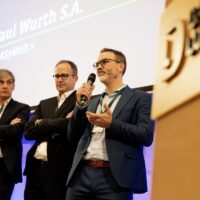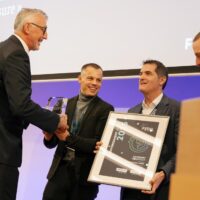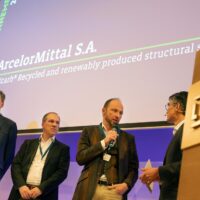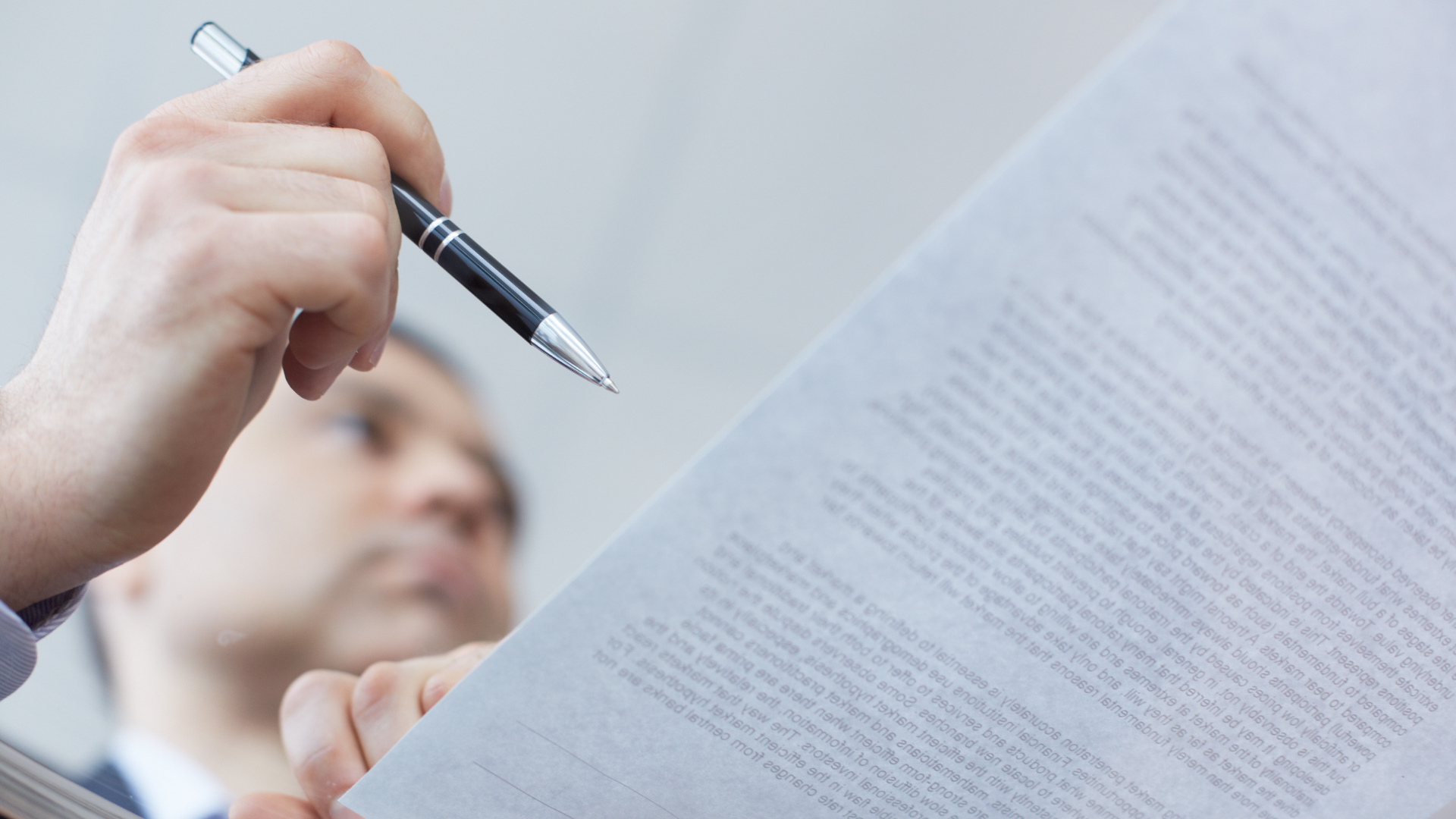Luxembourg, 27 November 2025 – The FEDIL Environment Award ceremony took place on 27 November 2025 in the auditorium of Banque de Luxembourg, a partner of the event. The awards ceremony was attended by Serge Wilmes, Minister of the Environment, Climate and Biodiversity, as well as numerous guests, members of the jury and the 2025 award winners.
For this 19th edition of the FEDIL Environment Award, 16 projects were submitted, from which the jury, composed of experts from the public and private sectors, awarded four prizes, namely:
- 2025 Environment Award in the category „Management“: „Renaturation of quarries“ by Carrières Feidt S.A.
Carrières Feidt, which operates six quarries in Luxembourg and one in the Eifel near Bitburg, is committed to an exemplary renaturation process, bringing nature back to life after the exploitation of its sites. Once the excavation phase is complete, a second life begins for the quarry: renaturation. This process aims to give back to nature what has been taken from it, by creating spaces conducive to animal and plant biodiversity. Renaturation does not begin at the end of exploitation, but is anticipated from the very start of work, according to a clear and sustainable concept developed in collaboration with experts. Each step is guided by the desire to leave behind an intact natural environment.Carrières Feidt favours two complementary approaches. The first consists of recreating natural habitats: lakes, biotopes, wetlands, hedges, shrubs and trees. These developments encourage the establishment of a variety of fauna and flora, including rare species of birds, lizards, toads, butterflies and insects. The lakes also serve as a stopover for migratory birds, thanks to the quality of the water and the diversity of fish species.
The second approach allows nature to reclaim its rights spontaneously, enabling ecosystems to regenerate freely. As a result, 500 fruit trees have been planted on 12 hectares and a cavity wall has been built to shelter rare nesting birds such as sand martins.
Each quarry benefits from a tailored renaturation project, with the common goal of preserving and enriching local biodiversity, while ensuring a sustainable natural heritage for future generations.
- 2025 Environment Award in the category „Process“: « EASyMelt » by Paul Wurth S.A.
Paul Wurth, a world leader in metallurgy and engineering, has developed EASyMelt, an innovative solution aimed at drastically reducing carbon emissions in steel production. The EASyMelt technology addresses the urgent need to decarbonize the steel industry, which is responsible for 7 – 8% of global greenhouse gas emissions. Traditional blast furnace methods rely heavily on coal, making it impossible to meet new climate targets. EASyMelt offers a flexible, scalable solution by retrofitting existing steel plants, thus avoiding the need for major new infrastructure.
EASyMelt converts by-product gases from steel plants into syngas, a cleaner fuel used in the ironmaking process. This technology, combined with advanced electric heating supported by plasma torches, reduces CO₂ emissions by more than 50%, with the potential to reach up to 70%.
The technology has progressed through several key development stages, from initial research and laboratory testing to pilot-scale demonstrations. EASyMelt’s flexibility allows it to use various energy sources, including renewable electricity, hydrogen, ammonia, coke oven gas as well as natural gas, making it adaptable to future energy transitions.
EASyMelt not only supports environmental sustainability but also enhances economic viability for steel producers. By reducing reliance on coal and coke, the process lowers operational costs and increases return on investment. The technology’s compatibility with carbon capture systems further strengthens its potential to achieve net-zero emissions. Paul Wurth’s EASyMelt technology positions Luxembourg as a leader in green industrial innovation, enabling steel producers worldwide to meet their climate targets with a cost-effective and reliable solution.
- 2025 Environment Award in the category „Product“: „PET Closure“ by Husky Technologies
As an industry leader in injection molding machines and molds, Husky Technologies has been at the forefront of beverage packaging innovation. Beverage closures available on the market are typically manufactured from either high-density polyethylene (HDPE) or polypropylene (PP) resin. While these materials offer a high level of performance at a light weight, they are usually downcycled into non-food contact applications such as pails, lawn furniture, and children’s toys.
To complete the PET bottle recycling journey Husky has developed PET closures, designed to be manufactured from 100% virgin PET (vPET), 100% recycled PET (rPET), or a combination of both. This breakthrough enables the creation of a true mono-material package, where both the bottle and the closure are made from the same material.
The environmental benefits of the PET closure are substantial. By using a mono-material approach, the need for additional sorting during recycling is eliminated, and the yield of rPET bales is increased. Furthermore, the rigid properties of PET allow for significant lightweighting opportunities, reducing the overall material usage on the bottle package. Strengthening both sustainability and lifecycle performance.
One of the key features of Husky’s PET closure is its ability to provide unmatched tamper evidence thanks to their new HyCAP SecuRE+ system. In this novel technology, a source of energy is precisely applied on the Tamper Evident Band. The heat creates deformation of the band around the pilfer proof and creating 360° of coverage. Additionally, the PET closure offers a superior sensory experience, with a distinct audible and tactile response when the tamper-evident band is broken.
The PET closure is poised to set a new standard in the beverage packaging industry, aligning with global sustainability goals and consumer preferences for environmentally friendly products. - 2025 Environment Award in the category „Product“: „XCarb® Recycled and renewably produced steel“ by ArcelorMittal
In 2021, ArcelorMittal, the world’s leading steel and mining company, launched its XCarb® initiative for recycled and renewably produced steel. This low-carbon emissions steel is made using a high proportion of steel scrap in an electric arc furnace (EAF) that is powered entirely by renewable electricity generated by recent solar and photovoltaic plants connected to the same grid as the Belval and Differdange mills. This process significantly reduces CO₂ emissions. XCarb® recycled and renewably produced steel can have a carbon footprint as low as 300 kg of CO2-equivalent per tonne of finished steel, when 100% scrap steel is used in the manufacturing process. This is significantly lower than the global average for the steel industry, which is around 2.3 tonnes of CO2-equivalent per tonne of steel. The process of using renewable electricity through Guarantees of Origin (GoOs) is externally certified.
The XCarb® initiative addresses the growing demand for low-carbon emissions products, driven by feedback from key stakeholders, including customers, public authorities and project owners, across Europe. Not only does XCarb® recycled and renewably produced steel have a significantly lower environmental impact, it also meets high quality and reliability standards, making it an ideal choice for construction and infrastructure projects. To date, over 500,000 tonnes of XCarb® recycled and renewably produced material have been delivered worldwide.
The environmental benefits of XCarb® recycled and renewably produced steel, compared with steel produced via the conventional route, are most significant in terms of carbon emissions and energy use. The product supports the principles of the circular economy and contributes to improved air quality and reduced resource depletion. Additionally, XCarb® recycled and renewably produced steel is fully recyclable, aligning with corporate sustainability strategies and reinforcing the commitment to achieving net-zero steel production. Looking ahead, continued investment in next-generation technologies will further reduce emissions and expand the XCarb® product range.
These four projects fully meet the requirements of the Environment Award regulations, including ecological interest, innovation, sustainable development and practical feasibility. The winners received their trophy and certificates accompanied by films specially created for the occasion, highlighting each project.
After Pit Linster, Head of Enterprises & Entrepreneurs at Banque de Luxembourg, welcomed the guests, Georges Rassel, Chairman of FEDIL, emphasised that the Environmental Award aims to reward innovative players working towards ecological transition for the benefit of society. This award is part of a strategy that encourages the development of coherent and ambitious policies, as well as investment in clean technologies. Georges Rassel added that the transition must be fair and equitable in order to preserve competitiveness, employment and economic viability in the face of climate challenges. Finally, he praised the quality of the projects submitted, which demonstrate the commitment of businesses to a responsible approach to climate and ecology.
The evening also featured a lecture by Domenico Franceschino of Axpo Benelux entitled „Economic Sustainability of the Energy Transition“. He showed that, to unlock the fully potential of renewable energies, it is essential that projects are both environmentally friendly and economically resilient. Drawing on concrete examples from across Europe, the speaker outlined the main market risks that can determine the success or failure of renewable projects. He particularly emphasised the important role that energy suppliers can play in helping to limit these risks.
About: FEDIL Environment Award
Launched for the first time in 1987 as part of the European Year of the Environment, and after several annual editions, the award has been organised every two years since the early 1990s, alternating with the FEDIL Innovation Award.
FEDIL press contact

laurence.kayl@fedil.lu
+352 43 53 66-617
